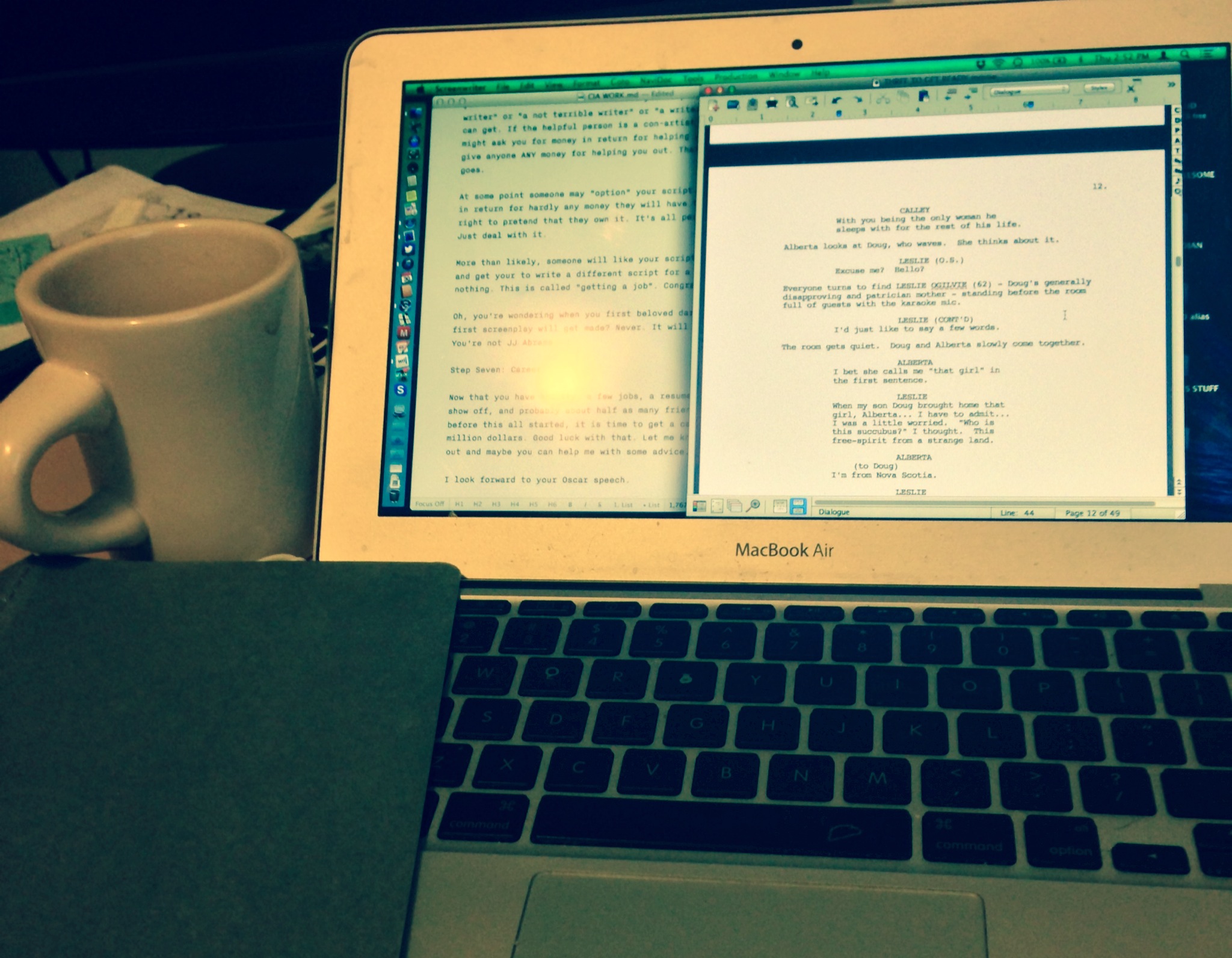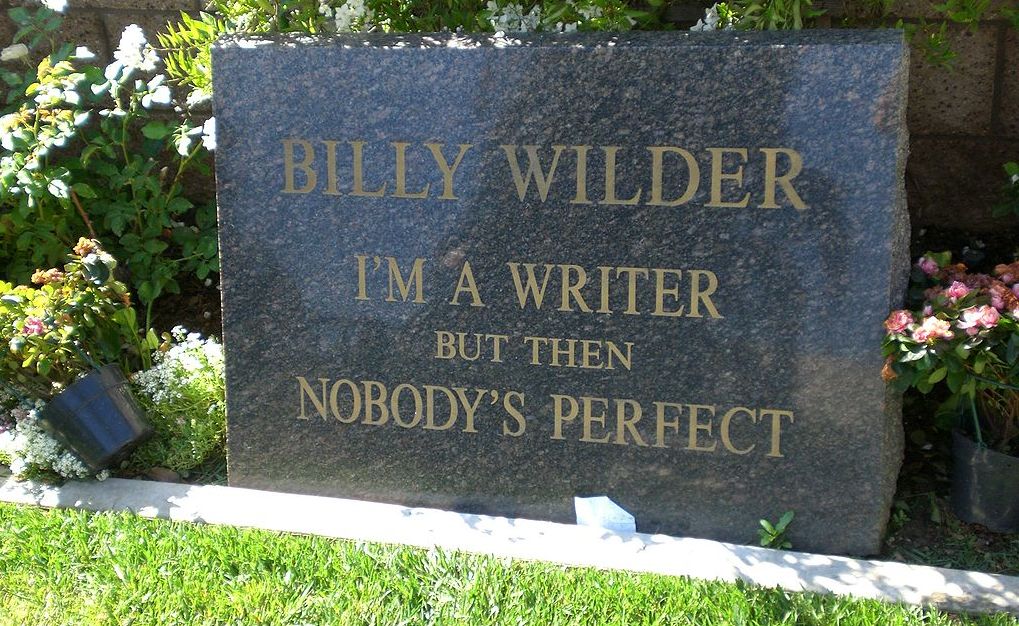How To Be A Screenwriter (If You Can't Be Anything Else)
This article was originally published for the blog CalgaryIsAwesome.com. You can read it in its original form by following THIS LINK.
When I'm not here at CalgaryIsAwesome writing about the talented and amazing people in Calgary who make and show and work in film, I fill my days by writing movie and television things for various production companies here in Alberta and for funding agencies and others across the country. Basically, I'll write for anyone who has the wherewithal to pay me. It's what I call being a screenwriter in Calgary.
Now then, in the course of doing this as a job over the last six years people have, occasionally, asked me to advise them on how they could follow the same path into relative obscurity - they have asked me "How To Be A Screenwriter." And, I suppose if some people want to know, then maybe some of you might be keen to know as well. So for those who are morbidly curious about becoming a screenwriter or working in movies, here we go...
Step One: Don't.
Not even being facetious. If you can be anything else, don't be a screenwriter. I don't mean to sound flippant, but the arts is a hard road to travel and unless you are absolutely convinced that you would be the unhappiest person doing something sensible like accounting, then you should try to avoid writing. It's a job best left to those willing to deal with a few years of bad pay and frustration and false starts and horrible criticism and nagging self-doubt. However, if that doesn't scare you off, then you should feel free to venture forth.
Step Two: Study.
I know this seems ridiculous. Movies are terrible and probably written by sixteen trained monkeys - but even so, you still need to learn how to do it properly. Trust me, it's for your own good. If you decide to write a screenplay then you will be using words and characters as your tools and learning to properly use a tool is the best way to build a house that doesn't fall down and make you look like a dummy. Also, I just wrote 'use a tool' with a straight face. Carrying on...
Learning to be a screenwriter doesn't have to involve school (though it's not a bad idea), but it should definitely involve study and analysis. So you have to watch lots of movies. Doesn't matter what kind, good or bad, new or old, silent or loud - watch them, then watch them again, and again. Then write down what happens. What's the plot? Who are the characters? Learn why things were written the way they were.
You can also read screenplays. You can buy them at good bookstores, find them at Amazon or wherever, check out http://scriptshadow.net which has lots of other peoples scripts and reviews, or you can Google until you stumble across something. But read, always be reading. See how things are formatted, what do good scenes do versus bad ones, how are plots laid out? Watch a movie and read the script at the same time - what works, what doesn't?
Finally you could read a book about screenwriting. By and large these books are pointless. Yes, even that one that you heard about or the one by that guy who died. They will not make you a good screenwriter. They can, however, teach you the basics and show you how to be just like a million other people who think there's a short cut to success. There's not, I'm sorry. You can read these books and take the few good things they offer, but in the end - this will require hard work and patience.
Your job through all of this is to immerse yourself so completely in what you want to do that your fingers get all pruney and your relationships suffer. If you've done that, then congratulations - you're on your way to being a writer. Sorry.
Step Three: Think.
So far you have confirmed your desire to write and you have studied your craft to the best of your ability. Now the time has come to put your drive and new-found knowledge to use. It's time to think of a movie to write.
First step is go ahead - think of an idea. Got one? It's terrible, think of another. Got another one? Also terrible, try again. Do that a dozen times. Now a dozen more. Now go back the your third idea, now the fourth. Good enough. Welcome to the self-doubt and circular horror of being a writer.
Take your idea out into the sunshine. Tell people about it. Think about it. Share it. Everyone hates it? Try another. Everyone loves it? They're probably lying. Keep thinking.
Think about your ideas so long and so hard that you start to hate them. Know them from every angle. Who are your characters? Why are you taking them on this journey? Is it even worth taking? If so, why so? If not, start over.
Here's a good rule of thumb: If your story is NOT the most important thing to EVER happen to your character in their entire life, then you are telling the wrong story.
It doesn't have to be huge, but tell a story that matters to your character. Tell it as economically as possible and don't use too many swear words. Can you tell that story to people without them falling asleep or faking a stroke? They're probably just being kind - but that's good enough for us.
Now it's time to actually get down to writing. So don't slam your fingers in any car doors for the next few minutes.
Step Four: Write.
Sit at a desk, in front of your computer, and bleed.
There are as many different processes and methods for screenwriting as there are Spider-Man origin movies. (Yes, two) But finding the one that works for you will be a long, arduous road. Some writers like to use index cards and plan everything out on a big board. Some write treatments, some write beat-sheets, some write outlines. Some people use Final Draft, or a word processor, or a typewriter whatever the heck that is. I heard about one person who wrote a script with that operating system from the Joaquin Phoenix movie. "Gladiator" had computers in it, right?
Truth is, it doesn't matter which way you write. I'll say it again - It doesn't matter. Find what you like best, find what helps you get it done. That's your only goal. Get it written.
A good script will have a strong beginning, middle, and end. It will have clever dialogue with subtext and counter-point. A good script will be surprising and immersive. It will be thematically strong. A good script will have short strong scenes and emotionally charged sequences. It will keep the reader asking "what happens next" and it will blow peoples minds with its subtle complexity and powerful message.
A good script will do all those things. Yours won't. Mine never have. But a good one will.
Just get it done.
Step Five: Rewrite.I know you just wrote it and you're feeling very proud. And you should feel proud. You managed to accomplish something that even the eight guys who wrote "Scary Movie 4" and "Garfield 2" could do. You wrote a screenplay.
But you know what those terrible writers probably didn't do a lot of? Rewriting. That's right. Even after you're done, you're not done. So take a week off to feel good about writing a probably terrible movie and then sit back down and make it better.
Memorize this quote from Thomas Mann: "A writer is a person for whom writing is more difficult than it is for other people." That's your life now.
Rewriting is hard because you think what you did is great. Of course you do, that's why you finished. No one stops writing because they think they're NOT done. But it doesn't matter because all writing is rewriting. So go back and make all your dialogue shorter. You also have too many characters. And it's probably at least twenty pages too long. And I thought I told you not to swear too much?
Rewriting is all about being as critical of yourself as possible. I know you're good at that because you decided back in step one that you really want to be a screenwriter - that means you already hate yourself a little bit. Now channel that self-loathing toward your script. It's going to hurt a little, but this pain is what separates you from the screenwriters of "The Green Lantern". So remember that.
Slowly, day by day, your screenplay will become a little better. I promise. Be critical and be thoughtful. Ask yourself why you made the choices you did. What were you thinking?
Rewrite your script at least two times. Now you have a first draft. Take a nap.
Step 6: Show.
Now it's time to show people your script and tell your parents that you've become a screenwriter. Prepare for some crying. From both you and them.
Tell everyone that you're a writer. Tell them your idea. Tell them about your script. They will all hate you and stop inviting you to things. Go meet some producers, meet some actors, meet camera people. Someone somewhere will foolishly ask to read your screenplay. Jump on them like they're the last piece of pizza.
It will take a long time for people to believe that you're a writer, it might take many scripts, but eventually someone will offer to help you out. If they're a decent sort they will share your work with others and introduce you to people as "a great writer" or "a not terrible writer" or "a writer" - take what you can get. If the helpful person is a con-artist or the devil they might ask you for money in return for helping you out. Do NOT give anyone ANY money for helping you out. That's not how it goes.
At some point someone may "option" your script. That means that in return for hardly any money they will have the exclusive right to pretend that they own it. It's all perfectly normal. You're having fun.
More than likely, someone will like your script enough to try and get you to write a different script based on a worse idea for a small fee, or for free. This is called "getting a job". Congrats. Do your best and hope you get some more.
Oh, you're wondering when your beloved darling baby of a first screenplay will get made? Never. It will never get made. You're not JJ Abrams.
Step Seven: Career.
Now that you have ability, a few jobs, a resume, some scripts to show off, and probably about half as many friends as you did before this all started, it is time to get an agent and a career and make a million dollars. Good luck with that. I look forward to reading your screenwriting book about how you made it happen.
Also, thank you for not asking me to read your script.


